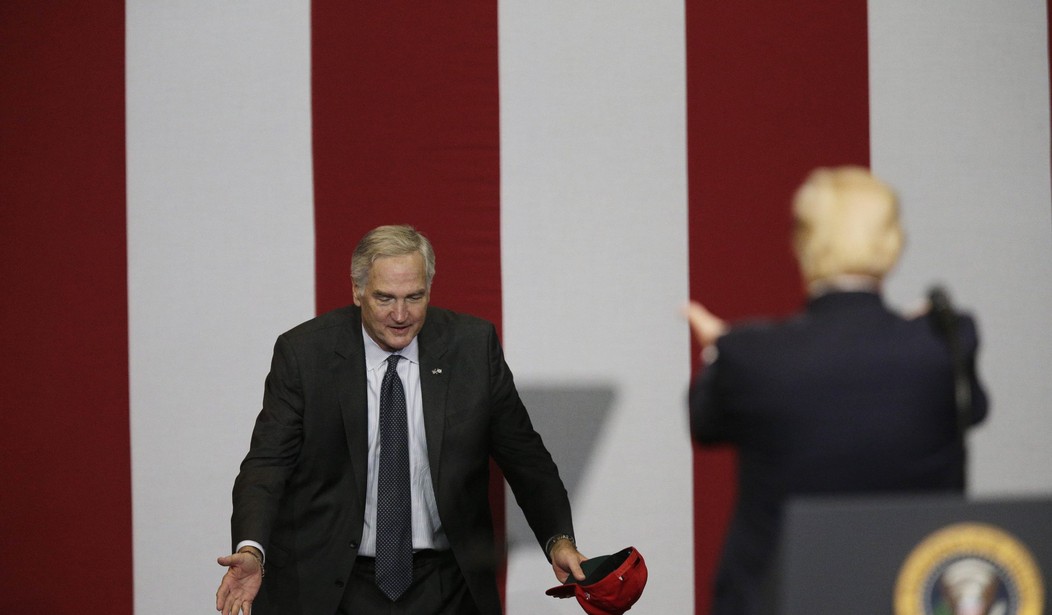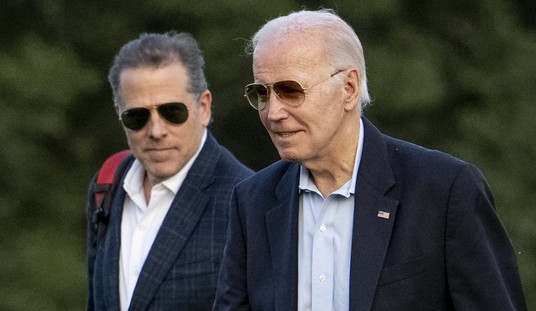On Tuesday night, Alabama Republicans will have to pick between candidates with the last names of Moore and Strange. But it only gets stranger from there.
Here are five things to know about the runoff election.
1. Stranger things.
Luther Strange, a former attorney general of Alabama, was appointed to the U.S. Senate to replace Jeff Sessions (now U.S. attorney general) in February. The fact that Strange was appointed, rather than elected, means he does not have the electoral advantage of incumbency.
Worse, Strange owes his appointment to Gov. Robert Bentley, the scandal-plagued medical doctor who resigned from his office in disgrace this past April, following a sex scandal with long-term aide Rebekah Mason.
Strange has received many prominent endorsements, most notably from President Donald Trump.
Senator Luther Strange has done a great job representing the people of the Great State of Alabama. He has my complete and total endorsement!
— Donald J. Trump (@realDonaldTrump) August 9, 2017
After the polls opened Tuesday, Trump tweeted, “ALABAMA, get out and vote for Luther Strange — he has proven to me that he will never let you down! #MAGA”
https://twitter.com/realDonaldTrump/status/912670906828443648
Other notable figures have backed Strange, including Alabama’s other sitting U.S. senator, Richard Shelby. Tom Bradford, president of the National Christian Foundation of Alabama, has also endorsed Strange, along with the National Rifle Association, the National Right to Life Committee, and the Home Builders Association of Alabama.
The National Republican Senatorial Committee (NRSC) has warned consultants not to work against Strange. “We have made it very clear from the beginning that Sen. Luther Strange would be treated as an incumbent,” NRSC spokeswoman Katie Martin told Politico.
But Strange has also been endorsed by Senate Majority Leader Mitch McConnell (R-Ky.), who has worked with Strange in the U.S. Senate. According to a CNN poll released Tuesday, a paltry 31 percent of Republicans have a favorable view of McConnell. Even the generic “GOP leaders” polled higher, at 39 percent. House Speaker Paul Ryan (R-Wis.) also has a higher favorability, at 58 percent.
McConnell’s support — and that of the NRSC — may brand Strange an “establishment” candidate, regardless of Trump’s support.
2. Tell me Moore.
Roy Moore, former chief justice of the Alabama Supreme Court, consistently led in the polls, before and after the primary election last month. Moore’s cultural profile makes him extremely competitive in a deep-red state like Alabama.
As FiveThirtyEight’s Harry Enten pointed out, evangelical Christians formed the backbone of Moore’s base before the primary. In a JMC Analytics and Polling survey, Moore enjoyed the most support from self-described evangelicals, 38 percent of whom backed him. He took a distant third among those who did not describe themselves as evangelical, however, with just 14 percent.
Arkansas Gov. Mike Huckabee had a similar polling profile in the 2008 Republican presidential primary. Huckabee had a 20-plus-point gap between evangelicals and non-evangelicals in Alabama, but won that primary with 41 percent of the vote. Also like Huckabee in 2008, Moore enjoys the support of Iowa radio host Steve Deace and actor Chuck Norris.
Forrest Hood “Fob” James, Jr. has also endorsed Moore. A former professional football player, James served two terms as Alabama’s governor, from 1979 to 1983 as a “born again Democrat,” and from 1995 to 1999 as a Republican.
John Giles, former president of the Christian Coalition of America’s Alabama chapter, and Phil Robertson, a popular Christian reality television star, have also backed Moore.
Moore is a perfect fit for evangelical voters. He was removed from his post as Alabama’s chief justice in 2003 for refusing to remove a monument to the Ten Commandments, and he was again suspended from office in May of last year for failing to enforce the U.S. Supreme Court’s 2015 ruling on same-sex marriage in Obergefell v. Hodges.
The former Supreme Court chief justice has also stirred up controversy for referring to native Americans and Asian-Americas as “reds” and “yellows.” To a media obsessed with race and micro-aggressions, Moore’s explanation that he was referring to the song “Jesus Loves the Little Children” could not hold water. To evangelical Christians, though, this was the precise meaning of his statement — about racial reconciliation, a clear part of the message of the Christian gospel.
3. The Roy-led Trump base.
More strange than Moore and Strange themselves has been the narrative-flipping nature of the Alabama Senate runoff. President Donald Trump has endorsed Strange, but one of his former chief advisors, Breitbart executive chairman Steve Bannon, has backed Moore wholeheartedly.
On Monday night, Moore held a rally with Bannon, Phil Robertson, and Nigel Farage, former leader of the UK Independence Party (UKIP) and an early advocate for Brexit. Bannon and Robertson enthusiastically endorsed Trump last year, while Farage publicly declared that if he were a U.S. citizen, he would also vote for Trump.
https://twitter.com/MooreSenate/status/912686876808634371
The support of such Trump figures represented a major coup for Moore, despite the president’s backing of Strange. Even so, this past weekend Trump himself campaigned in person for Strange, after Vice President Mike Pence did so.
On Monday, Bloomberg’s Sahil Kapur suggested, “The Roy Moore-Luther Strange primary is really a test of whether Trumpism still needs Trump to survive and win elections.” It is legitimately difficult to predict which endorsement will trump all the others.
Hot take: The Roy Moore-Luther Strange primary is really a test of whether Trumpism still needs Trump to survive and win elections.
— Sahil Kapur (@sahilkapur) September 25, 2017
During a debate, Moore adopted the Bannon tack, that McConnell is somehow manipulating Trump to abandon his agenda. “The problem is President Trump’s being cut off in his office. He’s being redirected by people like McConnell who do not support his agenda, who will not support his agenda in the future,” Moore argued.
Trump’s own anti-establishment rhetoric is being used against his own candidate in Alabama. The runoff is basically 2016 Trump versus 2017 Trump. Could this race get any Moore Strange?
4. Either way, Trump loses.
From the beginning, Moore has led in the polls, and even after both Pence and Trump campaigned for him in person, Strange has not enjoyed a similar poll boost.
A poll released less than 24 hours before polls opened Tuesday showed Moore holding on to his substantial lead. Cygnal, an Alabama-based research and communication firm, found 52 percent of Republican voters backed Moore, with only 41 percent supporting strange. The margin of error? 3.1 percent.
Three other polls came out on Monday. Emerson gave Moore a 50-40 percent lead; 0ptimus gave him a 55-45 percent lead. Trafalgar had Moore ahead 57-41 percent.
Strange has not led in a single poll, and Moore has consistently held a 10-point advantage. Last month, Strange only lost to Moore by about 6 points: Moore took 38.9 percent to Strange’s 32.8 percent. Even if the polls underestimate Strange’s support, it would require a near miracle for him to defeat Moore. Last November showed that such miracles are indeed possible, but Strange shouldn’t count on it.
To answer Kapur’s question, it seems Trumpism can indeed survive, even in opposition to Donald Trump.
Here is every single #ALSen Republican runoff poll released since the initial primary. pic.twitter.com/9hCS9w2TyY
— Decision Desk HQ (@DecisionDeskHQ) September 25, 2017
5. Hints of regret?
On Friday, President Trump seemed to suggest he regretted backing Strange.
“I might have made a mistake and I’ll be honest I might have made a mistake,” the president told the crowd at a rally in Huntsville, Ala. “If Luther doesn’t win, they’re not going to say we picked up 25 points in a very short period of time. They’re going to say Donald Trump, the president of the United States, was unable to pull his candidate across the line. It is a terrible, terrible moment for Trump. This is total embarrassment.”
The president did insist, however, that if Moore wins, “I’m going to be here campaigning like hell for him.”
Laughably, Trump declared, “Just look at the polls, Luther will definitely win.”
Then the Republican who dominated the state of Alabama last year (62.9 percent to 34.6 percent) said, “Roy has a very good chance of not winning in the general election. It’s all about the general. Don’t forget, we don’t stop here.”
With a straight face, Trump suggested, “Luther is going to win easily and Roy’s going to have a hard time winning” in the general election. While Moore has made quite a few controversial statements, Alabama voters tend to be much more conservative — especially culturally — than Democrats would prefer.
Whoever wins Tuesday night, the Republican will start the general election as a heavy favorite to defeat Democrat Doug Jones.
In any case, it is legitimately difficult to think of an election more strange. Indeed, how wacko is it that after the stunning election of Donald Trump last year, this Moore-Strange runoff pitting one Trump-style candidate against another Trump-endorsed candidate just before the 500th anniversary of the Protestant Reformation would involve a man whose first name is Luther?
If this Strange underdog does pull off a win, will it be due to an eery political version of the historic “Protestant wind”?








Join the conversation as a VIP Member